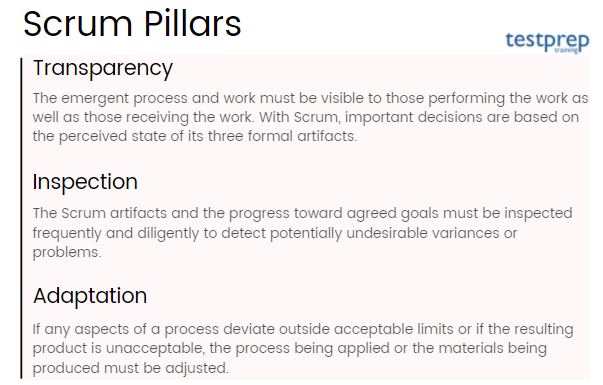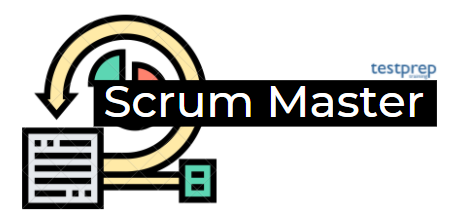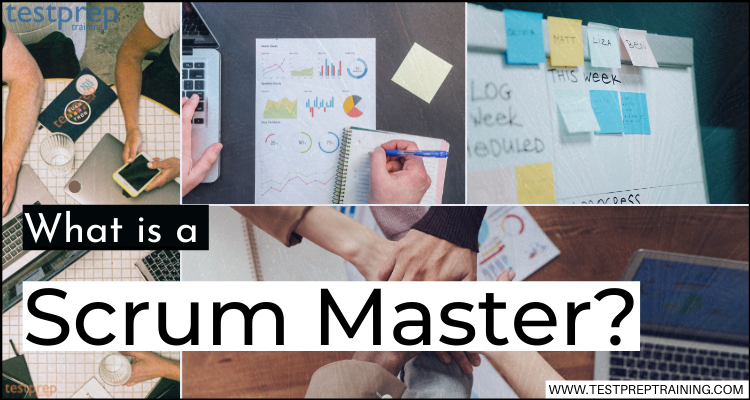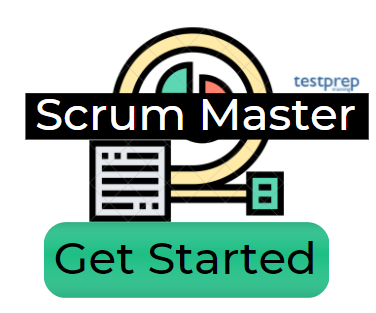Along with having a strong understanding of the practices and values of Scrum, Scrum Master helps individuals in validating and certifying their understanding of how they would respond to situations that challenge them. In the role of Scrum Master, the term Scrum plays a crucial role. It is important to get an understanding of Scrum values to become a Professional. In this blog, we will elaborate on the role of Scrum Master and the path that will take you towards a professional career in this. But, before starting just take a look at the basics pillars of Scrum.
The term Scrum provides an iterative, incremental approach for optimizing predictability and controlling risk. There are four formal events for inspection and adaptation within a containing event, the Sprint. These events work considered as a Scrum pillar.

Moving on, let’s get started with Scrum Master.
Who is a Scrum Master?
The Scrum Master term is accountable for establishing Scrum that is part of a Scrum Team. Where Scrum Team refers to the fundamental unit of Scrum consisting of a small team of people. This includes one Scrum Master, one Product Owner, and Developers. However, they help everyone in understanding Scrum theory and practice, both within the Scrum Team and the organization. Further, they are responsible for the Scrum Team’s effectiveness. That is to say, they enable the Scrum Team for improving its practices, within the Scrum framework.
Scrum Masters are true leaders for serving the Scrum Team and the larger organization.
In the below section, we will learn about the Scrum Master roles in various areas.
Scrum Master: Major Roles
1. The Scrum Master serving the Scrum Team by:
- Firstly, coaching the team members in self-management and cross-functionality
- Secondly, helping the Scrum Team focus on designing high-value Increments for meeting the Definition of Done
- Thirdly, causing the removal of impediments to the Scrum Team’s progress
- Lastly, making sure that all Scrum events take place and are positive, productive, and kept within the timebox.
2. The Scrum Master serves the Product Owner by:
- Firstly, helping in finding techniques for effective Product Goal definition and Product Backlog management
- Secondly, helping the Scrum Team in understanding the need for clear and concise Product Backlog items
- Thirdly, helping in establishing the empirical product planning for a complex environment
- Lastly, facilitating stakeholder collaboration as requested or required.
3. The Scrum Master serves the organization by:
- Firstly, leading, training, and coaching the organization in its Scrum adoption
- Secondly, designing and advising Scrum implementations within the organization
- Thirdly, helping employees and stakeholders in understanding and enacting an empirical approach for complex work
- Lastly, removing barriers between stakeholders and Scrum Teams.

But, what makes the Scrum Master valuable? The answer is their special skills and qualities. Let’s understand them!
What are the qualities of a Scrum Master?
Scrum Master has many abilities and skills. Some of them are:
- Scrum Master acts as a leader whose focus is on the requirements of the team members and the goal of achieving results in line with keeping the organization’s values, principles, and business objectives.
- Secondly, they are facilitators by setting the stage and providing clear boundaries for the team to collaborate.
- Thirdly, they are also a Coach for the individual with a focus on mindset to have continuous improvement in the team and the organization in truly collaborating with the Scrum team.
- Next, they behave as a mentor who transfers agile knowledge and experience to the team. As they get involved with the team with setting up to process. They ensure the entire team supports the implemented Scrum process.
- Then, they have the ability to understand team development. They focus on various phases a team will go through when working as a team.
- Next, Scrum Master focuses more on principles than practices. Moreover, they recognize team conflict in an early stage in order for applying various activities for resolving it.
- They maintain a good relationship with the Product Owner for the development of the team. Moreover, they apply various concepts engaging users in solving problems and increase users’ contribution.
- Lastly, they know about the strengths, weaknesses, opportunities, and risks of every method/framework/principle. They use their skills to understand what a team wants for achieving and helping them become more effective in an agile context.
“What makes Scrum Master different from Project Manager?“
- Both a scrum master and a project manager focus on getting the work done within a team and solve workflow problems using the process. Where the project manager tracks timeframes, report progress, and coordinate team communication. And, the scrum master helps the team in enhancing and streamlining the processes for achieving their goals.
- Further, a project manager helps in managing the project time, resources, and scope in order for meeting business requirements. And, the scrum master acts as a coach and facilitator that works for the team development team to work and achieve the goal using the scrum practices.
Above, we have understood the basic overview of the Scrum Master and its related qualities. In the next section, we will check the ways of becoming a scrum master.
How do you become a Scrum Master?
For becoming a Scrum Master it is important to have the right skills, knowledge, and path. So, below we will start with a step-by-step path to achieve the goal.
1. Start Reading
A Scrum Master in their profession has to work hard to guide and support their teams and organisations in the effective use of Scrum. And, this requires you to get knowledge and understanding of Scrum and its value. So, you have to start reading books to become an expert for coaching, mentoring the team and organization. The major areas you can read about includes:
- Scrum
- Coaching
- Organizational Change
2. Get Training and Experience
It is important to learn by getting training from experienced professionals. For becoming a professional scrum master, you must start your Scrum and Product owner training to excel in these areas. And, then with getting the required knowledge and experience, moving towards the advanced classes for Scrum Master and Product Owner. Moreover, getting the required training and experience will provide you with benefits during applying for the certification exam. And, you must remember most of the companies only want someone with the right experience and knowledge.
3. Get Certified
After getting the training and experience, it is time to get yourself certified to become a Professional. However, in the journey of Scrum Master, there are three levels of certification starting from level 1 then moving to the advanced level that is level 3. So, let’s understand these top-level certifications.
1. Professional Scrum MasterTM level I (PSM I)
The Professional Scrum MasterTM level I (PSM I) exam is best for anyone who wants to validate their knowledge of the PictureScrum framework and its application. Passing this exam will help you earn a recognized PSM I Certification for demonstrating a fundamental level of Scrum mastery. However, you must know that, if you have a high level of Scrum knowledge, understanding of the Scrum Guide, and know-how to apply Scrum within Scrum Teams, you can directly take the PSM I assessment without any need for the training course.
Preparing for the Assessment
This exam assessment is difficult and good preparation is needed for achieving a passing score. For this, you can take help from the courses provided for this exam that includes a 2-day Professional Scrum Foundations or Professional Scrum Master course. Or, you can start reading the Scrum Guide, and taking the Open Assessments alone with keeping in mind the following content:
- Firstly, this assessment covers topics from multiple Focus Areas explained by the Professional Scrum Competencies.
- Secondly, most of the questions asked will make you think about or interpret the meaning from the Scrum Guide and the process of applying Scrum within a Scrum Team.
- Thirdly, you can use the Scrum Master Learning Path which contains many additional resources that will help you in preparation.
2. Professional Scrum MasterTM level II (PSM II)
The Professional Scrum MasterTM level II (PSM II) exam will help in demonstrating your ability to apply the Scrum framework to solving advanced, complex problems in the real world. Passing this exam will help you earn the industry-recognized PSM II Certification that will showcase your advanced knowledge and abilities pertaining to Scrum and the role of the Scrum Master.
However, this exam requires advanced Scrum knowledge and in-depth Scrum experience. And, this is good for someone who has taken the Professional Scrum Master course prior to taking this assessment.
Preparing for the Assessment
This assessment is exhaustive and there will be questions that will ask you to think about or interpret the meaning from the Scrum Guide, apply content from the PSM II subject areas, the process of applying scrum within the scrum team, and application of your own experience. So, with reading the Scrum Guide and taking the Open Assessments, you have to also focus on the content below:
- Firstly, the exam covers topics from multiple focused areas explained by the Professional Scrum Proficiencies and detailed on the PSM II Suggested Reading page.
- Secondly, you can use the Scrum Master learning path which contains many additional resources for helping you in preparation.
- Thirdly, this is an advanced Scrum Master certification so it is important to read content from the Product Owner, Agile Leader, and Development Team Member learning paths.
- Lastly, you can attend the 2-day Professional Scrum Master II course for a better understanding of the Scrum concepts.
3. Professional Scrum MasterTM level III (PSM III)
The Professional Scrum MasterTM level III (PSM III) exam is for those who have passed the PSM I and PSM II assessments. This exam will help in:
- demonstrate a distinguished level of Scrum mastery
- getting a strong understanding of the application of Scrum, Scrum practices, and the Scrum Values
- enhancing ability to apply Scrum in a variety of complex team and organizational situations.
Passing this exam will help you earn the global, industry-recognized PSM III Certification that will showcase your distinguished level of Scrum mastery and you can then mentor and coach people or teams who are adopting Scrum.
Preparing for the Assessment
- For this exam, firstly, gain a high level of Scrum knowledge and in-depth Scrum experience. For this, you can take help from the professional course.
- Secondly, most of the questions in the exam will ask you to think about or interpret the meaning from the Scrum Guide, apply content from the PSM I and PSM II subject areas.
Scrum Master: Job Market Value
Scrum Master plays a crucial role in an ogrnxation success. The role itself has a huge demand when havin the right skills, knowledge and certification. Talking about the salry, the average salary of a Scrum Master in India can range from Rs. 1,412,000 per annum to Rs. 2,268,000 per annum. However, this come down to as low as Rs. 7,02,000 per annum in some situations. This range totally depends on the level of experince, city and the company.
Final Words
Above we have understood the values, overview, process, and qualities of a Scrum Master. Becoming a Professional Scrum Master will not masters your skills but will also provide you with a way to solve real-world complex problems. This role is best in helping the individuals in validating and certifying their understanding of how they would respond to situations that challenge them. So, use the information in this blog to get an understanding of the Scrum Master. And, to become one get some experience and apply for the certification. For this, you can take help from the Professional Scrum training classes. As we believe that certification is the way using which you can showcase your skills in a far better way.



